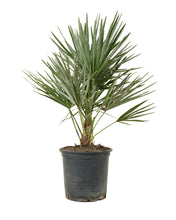Chamaerops humilis, commonly known as the European fan palm or Mediterranean fan palm, is a hardy and adaptable palm species prized for its compact size and attractive foliage. This palm features a multi-stemmed or clumping growth habit, with each stem topped with a crown of fan-shaped, palmate leaves. The leaves are typically green to bluish-green and can have a slightly waxy texture. It's a popular choice for gardens, patios, and containers, adding a touch of Mediterranean charm to various settings. It belongs to the Arecaceae family.
Origin: Chamaerops humilis is native to the Mediterranean region of Europe and North Africa. It is one of the few palm species native to Europe.
Light: Chamaerops humilis thrives in full sun to partial shade. It prefers at least 6 hours of sunlight per day to encourage strong growth.
Water: Water regularly, especially during hot, dry periods. Allow the soil to dry out slightly between waterings, but avoid letting it dry out completely.
Soil: Chamaerops humilis prefers well-drained soil. It can tolerate a range of soil types, but thrives in fertile, loamy soil.
Fertilising: Feed your Chamaerops humilis with a slow-release palm fertiliser in spring and summer.
Temperature: Chamaerops humilis is relatively hardy and can tolerate temperatures down to -10°C for short periods. However, it prefers warm temperatures and thrives in subtropical and tropical climates.
Pruning: Remove any dead or dying fronds to maintain a tidy appearance. Be cautious when pruning, as the sharp edges of the fronds can cause cuts.
Growth Habit: Chamaerops humilis is a slow-growing palm that typically reaches a height of 2-5 metres (6-16 feet). It often forms a multi-stemmed clump.
Uses: Chamaerops humilis is primarily grown as an ornamental plant. The heart of the palm can be eaten, and the fibres from the leaves are used to make ropes and mats.
Toxicity: Chamaerops humilis is not known to be toxic to humans or pets. However, the sharp spines on the leaf bases can cause injury, so it's best to handle it with care.



